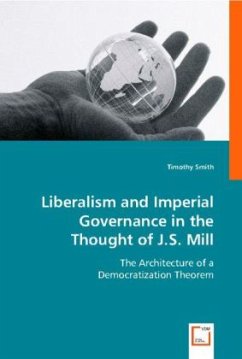In this work John Stuart Mill's classic text Considerations on Representative Government is framed as a treatise of a theorem for guiding "civilized" governors in imperially democratizing "non-civilized others" for the ends of historically moving humanity towards "civilizational progress." This theorem is broken down into an architecture which consists of the first four chapters of Considerations and a conceptual architecture consisting of three notions: imperialism, democracy, and good governance. In outlining this theorem, gaps and shortcomings currently existing in the body of literature that engages Mill's relationship with imperialism are identified. The theorem and the secondary literature are also used to problematize and argue against the call by some authors for a turn to Mill's imperialism.
Bitte wählen Sie Ihr Anliegen aus.
Rechnungen
Retourenschein anfordern
Bestellstatus
Storno








